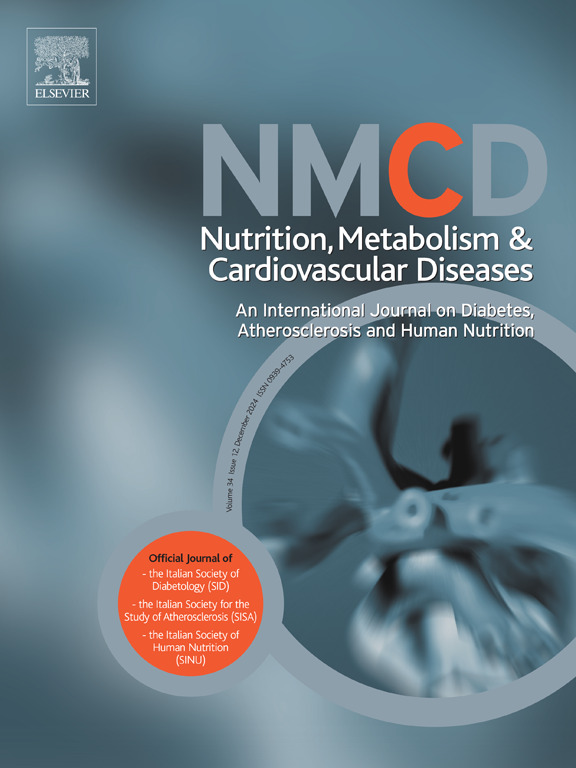Association between hemoglobin glycation index and adverse outcomes in critically ill patients with myocardial infarction: A retrospective cohort study
IF 3.3
3区 医学
Q2 CARDIAC & CARDIOVASCULAR SYSTEMS
Nutrition Metabolism and Cardiovascular Diseases
Pub Date : 2025-03-08
DOI:10.1016/j.numecd.2025.103973
引用次数: 0
Abstract
Background and aim
The prognosis of critically ill patients with myocardial infarction (MI) is associated with metabolic disturbances. The hemoglobin glycation index (HGI), a marker of glycemic variability, has been linked to adverse outcomes in critically ill populations. This study aimed to explore the relationship between HGI and adverse outcomes in critically ill MI patients.
Methods and results
This retrospective cohort study used data from the MIMIC-IV database, focusing on critically ill MI patients. Linear regression was applied to model the relationship between glucose and HbA1c, from which HGI values were calculated. Patients were grouped into quartiles based on HGI. Primary outcomes included 30-day, 180-day, and 365-day all-cause mortality. Kaplan-Meier survival analysis, logistic regression, Cox proportional hazards models, and restricted cubic spline (RCS) analysis were employed to assess the relationship between HGI and adverse outcomes. A total of 2480 patients were included. Lower HGI was associated with significantly increased risks of 30-day, 180-day, 365-day, and hospital all-cause mortality. RCS analysis revealed an inverse J-shaped relationship between HGI and mortality risk.
Conclusions
Low HGI in critically ill MI patients is significantly associated with higher all-cause mortality, highlighting its potential as a prognostic marker for early risk stratification and management optimization.

心肌梗死重症患者血红蛋白糖化指数与不良预后之间的关系:一项回顾性队列研究。
背景和目的:心肌梗塞(MI)重症患者的预后与代谢紊乱有关。血红蛋白糖化指数(HGI)是血糖变异性的标志,与重症患者的不良预后有关。本研究旨在探讨 HGI 与重症 MI 患者不良预后之间的关系:这项回顾性队列研究使用了 MIMIC-IV 数据库中的数据,重点关注重症心肌梗死患者。研究采用线性回归法建立血糖与 HbA1c 之间的关系模型,并从中计算出 HGI 值。根据 HGI 将患者分为四等分。主要结果包括 30 天、180 天和 365 天的全因死亡率。采用卡普兰-梅耶生存分析、逻辑回归、考克斯比例危险模型和限制性立方样条曲线(RCS)分析来评估 HGI 与不良结局之间的关系。共纳入 2480 例患者。较低的 HGI 与 30 天、180 天、365 天和住院全因死亡率风险的显著增加有关。RCS分析显示,HGI与死亡风险之间呈反J形关系:重症心肌梗死患者的低 HGI 与较高的全因死亡率显著相关,这表明它有可能成为早期风险分层和管理优化的预后标志物。
本文章由计算机程序翻译,如有差异,请以英文原文为准。
求助全文
约1分钟内获得全文
求助全文
来源期刊
CiteScore
6.80
自引率
2.60%
发文量
332
审稿时长
57 days
期刊介绍:
Nutrition, Metabolism & Cardiovascular Diseases is a forum designed to focus on the powerful interplay between nutritional and metabolic alterations, and cardiovascular disorders. It aims to be a highly qualified tool to help refine strategies against the nutrition-related epidemics of metabolic and cardiovascular diseases. By presenting original clinical and experimental findings, it introduces readers and authors into a rapidly developing area of clinical and preventive medicine, including also vascular biology. Of particular concern are the origins, the mechanisms and the means to prevent and control diabetes, atherosclerosis, hypertension, and other nutrition-related diseases.

 求助内容:
求助内容: 应助结果提醒方式:
应助结果提醒方式:


